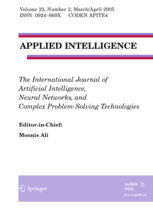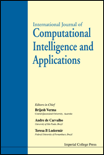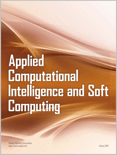
International Journal of Automation and Computing
Scope & Guideline
Empowering Research in Control and Systems Engineering
Introduction
Aims and Scopes
- Automation Technologies:
The journal explores advanced automation technologies including robotics, control systems, and intelligent systems aimed at enhancing efficiency and performance in various applications. - Computational Intelligence:
Research on computational intelligence techniques such as neural networks, fuzzy logic, and evolutionary algorithms is a core focus, targeting problem-solving in complex and dynamic environments. - Data Analysis and Machine Learning:
The journal publishes studies on machine learning methodologies, data analysis techniques, and their applications, particularly in predictive modeling and decision-making processes. - Robotics and Autonomous Systems:
Research relating to the design, control, and application of robots and autonomous systems is emphasized, showcasing advancements in multi-robot systems and autonomous navigation. - Human-Robot Interaction:
The journal investigates the relationship and interaction between humans and robots, exploring methodologies that enhance collaboration and mutual understanding. - Emerging Applications:
The journal serves as a platform for innovative applications of automation and computing in diverse fields such as healthcare, transportation, and environmental monitoring.
Trending and Emerging
- Artificial Intelligence and Deep Learning:
There is an increasing focus on AI and deep learning techniques, particularly in applications like image recognition, natural language processing, and autonomous systems. - Robust Control and Adaptive Systems:
Emerging themes in robust control strategies that adapt to uncertain environments are becoming more prevalent, highlighting the need for resilience in automation. - Data Augmentation and Synthetic Data:
The use of data augmentation and synthetic data generation techniques is trending, particularly in machine learning applications to improve model robustness. - Human-Centric Automation:
Research is increasingly oriented towards human-centric automation, emphasizing the importance of user experience and interaction in robotic systems. - Multi-Agent Systems and Cooperation:
The exploration of multi-agent systems and cooperative strategies in robotics is gaining traction, reflecting the need for collaboration in complex tasks.
Declining or Waning
- Traditional Control Systems:
Research on classical control systems has become less prominent, as the field shifts towards more adaptive and intelligent control methodologies that incorporate machine learning. - Basic Robotics Concepts:
Papers centered on foundational robotics concepts have decreased, likely due to the increased interest in complex systems and multi-robot collaboration. - Static Data Processing Techniques:
There is a noticeable decline in the exploration of static data processing methods, with a growing preference for dynamic and real-time data analysis approaches. - Purely Theoretical Studies:
The journal has seen fewer purely theoretical studies, as there is a stronger emphasis on practical applications and experimental validations in recent publications. - Low-level Programming and Hardware Design:
Research focused exclusively on low-level programming or hardware design has waned, reflecting a shift towards high-level algorithms and software solutions.
Similar Journals

Romanian Journal of Information Science and Technology
Exploring the Intersection of Knowledge and TechnologyRomanian Journal of Information Science and Technology, published by EDITURA ACAD ROMANE, serves as a distinguished platform for the dissemination of research in the expanding field of information science, specifically focusing on innovative technologies and methodologies. With an impressive Q1 ranking in Computer Science (miscellaneous) and a notable Scopus rank of 57/232 (75th percentile), the journal underscores its commitment to excellence and scholarly rigor. This open-access journal invites researchers, professionals, and students to contribute and engage with cutting-edge studies that shape the landscape of information science. With a publication history dating back to 2008 and continuing into 2024, it plays a vital role in fostering academic exchange and advancing knowledge in Romania and beyond. For those seeking to stay informed of the latest findings and trends, the Romanian Journal of Information Science and Technology is an invaluable resource that reflects the dynamic nature of the discipline.

International Journal of Fuzzy Logic and Intelligent Systems
Pioneering Research in Artificial Intelligence and LogicInternational Journal of Fuzzy Logic and Intelligent Systems, ISSN: 1598-2645, is a prestigious journal published by the Korean Institute of Intelligent Systems, dedicated to advancing the fields of Artificial Intelligence, Computational Theory and Mathematics, Computer Science Applications, Logic, and Signal Processing. Established to foster interdisciplinary research, this journal has quickly established its reputation, reaching a respectable Q3 quartile ranking across multiple categories in 2023. It serves as a vital resource for researchers, professionals, and students, offering insights into cutting-edge methodologies and innovative applications of fuzzy logic and intelligent systems. With a focus on disseminating high-quality research, the journal attracts contributions that drive the evolution of intelligent technologies and their practical implications. Published from South Korea, the journal is positioned to impact the global community, facilitating a deeper understanding of intelligent systems in various domains.

APPLIED INTELLIGENCE
Transforming ideas into impactful AI applications.Applied Intelligence is a prominent peer-reviewed journal that has been instrumental in advancing the field of Artificial Intelligence since its inception in 1991. Published by Springer, a reputable name in academic publishing, the journal focuses on the innovative applications of intelligent systems, algorithms, and methodologies across various disciplines. With an impressive Q2 ranking in the Artificial Intelligence category for 2023, and a Scopus rank of #117 out of 350 in its field, Applied Intelligence is recognized for its significant contributions and rigorous standards. The journal is accessed primarily through subscription, ensuring that high-quality research reaches the academic community and industry professionals alike. Its commitment to disseminating cutting-edge research makes it an invaluable resource for researchers, practitioners, and students interested in the practical implications of AI advancements. Join a community dedicated to exploring the transformative power of artificial intelligence and stay ahead in this ever-evolving field!

International Journal of Innovative Computing Information and Control
Pioneering insights in software engineering and beyond.International Journal of Innovative Computing Information and Control, published by ICIC INT, is a prominent platform dedicated to advancing the fields of computational theory, information systems, software engineering, and theoretical computer science. Since its inception in 2007, the journal has garnered attention for its rigorous peer-reviewed research and has established itself within the academic community, attaining a notable Q3 quartile ranking across its categories as of 2023. With an impressive track record of convergence from 2007 to 2024, this journal offers a wealth of insights and innovations for researchers and professionals striving to push the boundaries of technology and computing. While it operates under a subscription model, the journal's commitment to enhancing knowledge in the ever-evolving landscape of computational sciences makes it an essential resource for academics, providing timely articles that address contemporary challenges in the field.

International Journal of Computational Intelligence and Applications
Connecting Theory and Practice in Computational IntelligenceThe International Journal of Computational Intelligence and Applications, published by WORLD SCIENTIFIC PUBL CO PTE LTD, is a prominent journal dedicated to advancing the field of computational intelligence and its applications, with a keen focus on innovative methodologies and theoretical frameworks. With an impact factor reflective of its growing influence, the journal is classified in Q3 for Computer Science Applications and holds Q4 standings in both Software and Theoretical Computer Science as of 2023, showcasing its critical niche within these disciplines. Established in 2008 and converging through 2024, this journal serves as a vital resource for researchers, professionals, and students in Singapore and beyond, promoting scholarly communication and collaboration. Although it is a non-open access journal, it still provides a wealth of information that is readily accessible through institutional subscriptions and library resources. Researchers contributing to the journal benefit from its wide reach and dedicated readership, making it a substantial platform to disseminate groundbreaking research and insights.

Annual Review of Control Robotics and Autonomous Systems
Fostering Collaboration for Cutting-Edge Robotics ResearchAnnual Review of Control Robotics and Autonomous Systems, published by ANNUAL REVIEWS, is a premier, peer-reviewed journal dedicated to advancing the field of control, robotics, and autonomous systems. With its E-ISSN of 2573-5144, the journal is recognized for its high-caliber contributions, evidenced by its Q1 ranking in key categories, including Artificial Intelligence, Control and Systems Engineering, and Human-Computer Interaction. Spanning converged years from 2018 to 2024, it serves as an essential resource for researchers, professionals, and students who seek to stay abreast of the latest developments and methodologies impacting these rapidly evolving fields. The journal does not currently offer Open Access options, which enables it to maintain stringent quality control while ensuring that every issue is packed with scholarly articles that meet the highest academic standards. With a focus on interdisciplinary approaches and cutting-edge technologies, the Annual Review of Control Robotics and Autonomous Systems is poised as a critical voice for scholarly discourse, fostering innovation and collaboration in tackling complex challenges of the modern world.

JOURNAL OF INTELLIGENT & ROBOTIC SYSTEMS
Transforming Ideas into Intelligent ApplicationsJOURNAL OF INTELLIGENT & ROBOTIC SYSTEMS, published by Springer, is a premier interdisciplinary journal that focuses on the rapidly evolving fields of artificial intelligence, robotics, and their applications across various engineering domains. With an impressive impact factor and ranked in the Q1 and Q2 quartiles of multiple relevant categories—including Electrical and Electronic Engineering, Control and Systems Engineering, and Mechanical Engineering—this journal is essential for researchers, industry professionals, and graduate students seeking to stay at the forefront of innovation in intelligent systems. The journal publishes high-quality research articles, reviews, and technical notes that contribute to advancing theory, practice, and the integration of intelligent robotic systems better suited to meet contemporary challenges. Founded in 1988, and with a robust indexing in Scopus, the journal continues to foster scholarly discourse and serves as a critical resource for those passionate about the future of intelligent technologies, despite not currently providing open access options.

Studies in Informatics and Control
Bridging Disciplines in Informatics and Control SystemsStudies in Informatics and Control is a distinguished academic journal published by the NATL INST R&D INFORMATICS-ICI, specializing in the interdisciplinary fields of Computer Science and Electrical and Electronic Engineering. With an ISSN of 1220-1766 and a recognized standing within its field, this journal aims to foster innovation and disseminate high-quality research findings from 2010 through 2024. It maintains a significant presence in the academic landscape, holding a Q3 ranking in both Computer Science (miscellaneous) and Electrical and Electronic Engineering categories for 2023, which underscores its commitment to advancing knowledge and technology in these areas. While the journal is not open access, it provides valuable insights and results that are essential for researchers, professionals, and students striving to develop their expertise in informatics and control systems. Based in Romania, its contributions traverse international boundaries, appealing to a global audience keen on the latest developments and trends within these rapidly evolving fields.

Journal of Electrical Systems
Empowering Innovation in Electrical and Electronic EngineeringThe Journal of Electrical Systems is a prominent Open Access journal published by the ENGINEERING & SCIENTIFIC RESEARCH GROUPS since 2005, dedicated to presenting valuable research in the realms of Electrical and Electronic Engineering as well as Computer Science. With an ISSN of 1112-5209 and an E-ISSN of 1112-5209, this journal seeks to foster innovation and share knowledge among researchers and practitioners operating in these critical fields. Operating out of Paris, France, the journal has made significant strides despite recent categorizations placing it in the Q4 quartile of Computer Science and Electrical and Electronic Engineering. Its ongoing commitment to disseminating impactful findings is underscored by its open accessibility, enabling a wider audience to engage with research that spans various interdisciplinary applications. The journal continuously invites contributions that enhance our understanding of electrical systems, empowering stakeholders at all levels to push the boundaries of technology and engineering.

Applied Computational Intelligence and Soft Computing
Bridging Theory and Practice in Computational ResearchApplied Computational Intelligence and Soft Computing, published by HINDAWI LTD, is a premier open access journal that has been disseminating critical research since 2009, focusing on the intersection of artificial intelligence and soft computing. With an impressive array of quartile rankings in 2023, including Q2 in Civil and Structural Engineering and Computational Mechanics, this journal has established itself as a significant contributor to the fields of computer science and engineering. Based in Egypt, it plays a vital role in advancing knowledge by providing researchers, professionals, and students with easy access to high-quality studies. The journal’s rigorous peer-review process ensures that only the most impactful research is highlighted, making it an essential resource for those looking to stay abreast of the latest innovations and methodological advancements in applied computational intelligence. Its Scopus rankings further affirm its influence and reputation within the academic community, exemplifying its commitment to facilitating collaboration and fostering intellectual discourse in various scientific domains.